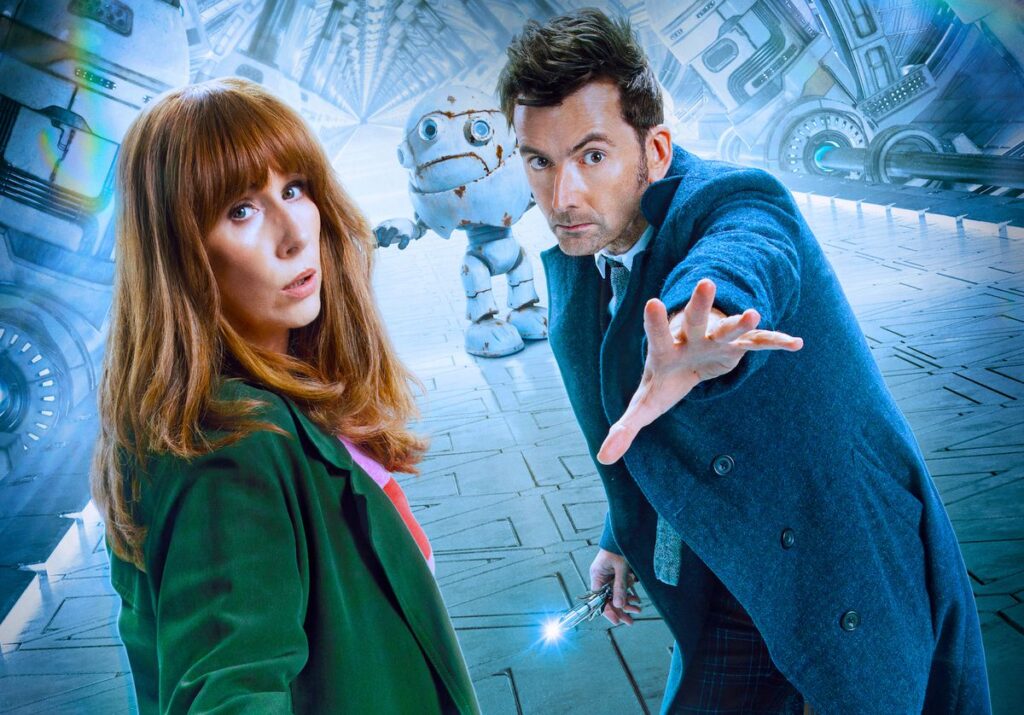After a spectacular re-introduction that almost-but-not-quite wiped the slate clean, Doctor Who spun around to do the exact opposite: Underline how much the previous era mattered. What’s more, it did so in a wonderfully taut standalone thriller, a propulsive riff on The Thing that will double nicely as a perfect episode to introduce new viewers into how great the show can be at knocking out twisty sci-fi mysteries.
“Wild Blue Yonder,” the second 60th anniversary special starring David Tennant as the Fourteenth Doctor and Catherine Tate as his companion Donna Noble, picks up immediately where “The Star Beast” left off, with the TARDIS going haywire and launching them through time and space. Things get quickly worse from there: The TARDIS drops The Doctor and Donna on an abandoned spaceship and then disappears.
The bulk of the episode revolves around The Doctor and Donna’s attempts to solve the mystery of what happened to the ship and its crew while also trying to figure out how to bring the TARDIS back to them. As mentioned, the episode is a deliciously twisty hour that’s best left unspoiled — but the most surprising thing about “Wild Blue Yonder” isn’t the solution to the mystery, but in how it references the show’s previous incarnation.
Something 21st century Doctor Who writers have returned to frequently is The Doctor as an ancient creature, and what being a person that has seen so much can do to your mind, your soul, your perspective. Mostly, this manifests as The Doctor being a very odd person, but a recurring theme of Davies original tenure (and Moffat’s after him) was how The Doctor’s functional immortality came with a drawback: It could make him mean. This is why a companion was always necessary as they would ground The Doctor, keeping him in check.
Image: Disney Plus
In “Wild Blue Yonder,” this moment comes when The Doctor and Donna talk briefly about the last 15 years of his life — or put another way, what he’s been up to since current head writer Russell T. Davies left the show and these two characters were together last. Specifically, they bring up “The Flux,” the crisis at the center of the Thirteenth Doctor’s (Jodie Whitaker) final season on Doctor Who, and the rage he feels at being responsible for having lost “half of the universe.”
Later, the two talk about if he will be OK. “I will be,” the Doctor says, in “a million years,” a line that’s both glib and painfully true.
It’s a beat that echoes another one of Davies’ decisions from 2005, reworking the Doctor’s history and alluding to an off-screen Time War that dramatically changed his status quo and gave the character an undercurrent of darkness and tragedy that would characterize much of the ensuing decade. This time, however, the “Time War” isn’t a convenient retcon, but “The Flux” — the final great crisis faced by Whitaker’s Thirteenth Doctor, firmly placing her disappointing run as another instrumental player in the grand tradition of Doctor Who.
In the context of these anniversary specials — which, unlike most previous anniversary specials, does not include any other previous incarnation of The Doctor (at least not yet) — this is a terrific little moment. It implies that Russell T. Davies’ return to Doctor Who isn’t merely interested in regression and returning to what worked last time, but how to move forward and consider who The Doctor might be now, with consideration to all the character has been through in the last 15 years.
The Doctor is an incredibly elastic character, one that can be whatever a writer or performer needs him to be in a given story as long as a handful of core tenets remain in place. But what makes him unique is the way The Doctor can acknowledge his own history when called to, and all of the goofy, excellent, and even misbegotten stories can be recontextualized in a way that resonates. Everything matters. Everyone lives.

